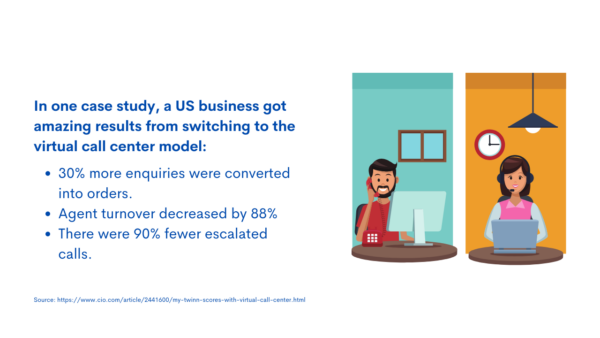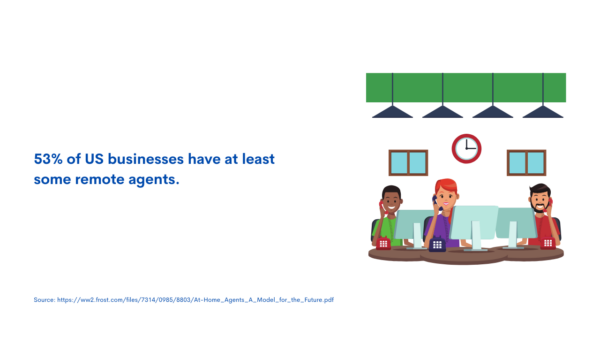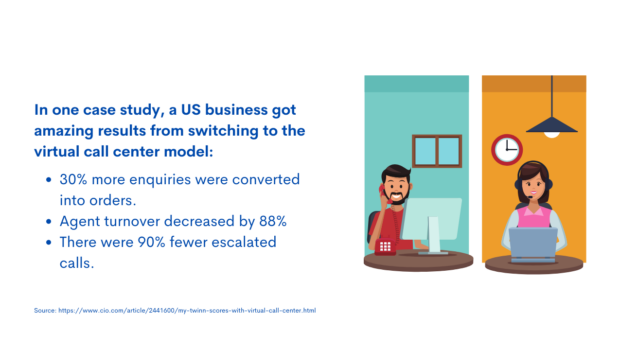Most Workers Are Back In The Office — So What Makes Virtual Call Centers Special?
The worst of COVID-19 is behind us, and a lot of workers are back in the traditional office. While it isn’t logistically possible for workers across industries like healthcare, manufacturing, and retail to work remotely, there has been a growing trend in other fields like customer service of decentralizing the workplace.
The accelerated growth of virtual call centers during the pandemic is an excellent example. Facilitated by the cloud, many call centers successfully transitioned to virtual operations during a time when many companies were struggling to survive. The positive industry-wide performance over the past few years has led to virtual call centers going from a stopgap solution to the new normal while most other workers are rushing back to the office.
So, what makes virtual call centers along with a few other fields so special? Read on as we shed light on the reasons behind a cultural shift towards remote working, as exemplified by virtual call centers.

But First, What Is A Virtual Call Center?
In a virtual call center (VCC), agents don’t come to a central workstation. Instead, they work remotely either from home or remote offices. To perform their roles, the remote agents need virtual call center software, which typically uses VoIP (Voice over Internet Protocol), an Internet connection, and telecommunication services.
What’s Driving The Shift Towards Working Remotely?
Several factors are fuelling the cultural shift towards working remotely. We outline some of the most important ones — reinforced by simple call center examples — below.
Productivity
The old belief that working from home would affect concentration and productivity was widely debunked throughout the pandemic. Not only was there no dip in output because of working from home, many studies directly attributed an increase in productivity to remote working instead. According to research by Finder:
- 65% of workers say they are more productive in a home office compared to a normal office
- 75% of workers say they are more productive because of less distraction
- 83% of workers feel they don’t need an office to be productive
- Two-thirds of employers report higher productivity among remote workers compared to in-office employees.
With both employers and employees on the same page about the uptick in work efficiency, there has been no reason for some operators to recall their staff back to the office.
Lower Employer Overheads
In addition to greater productivity, many businesses have seen the benefits of virtual operations reflected in their bottom line. In the context of virtual call centers, the proliferation of cloud-based call center solutions allows agents to maintain the same level of customer service from anywhere. Working remotely slashes expenses like rent, utilities, maintenance, security, as well as high on-premise set up costs, which eat into profits.
Working remotely slashes expenses like rent, utilities, maintenance, security, as well as high on-premise set up costs, which eat into profits. It’s also very easy to integrate other cloud-based tools such as CRM that employees rely on for work every day. Platforms like Slack and Trello facilitate seamless team collaboration while tools like Zoom and Google Hangouts are great for calls and screen-sharing discussions. And if there’s a need for face-to-face meetings, hired venues come with cost-effective hourly or daily rates.
Businesses have found that significantly reducing overheads opens opportunities to reinvest in the company and reward employees, which helps drive further growth.

Cost Savings For Employees
The cost savings don’t only benefit employers, they make a huge difference to employees as well. From travel to childcare and everything in between, the expenses quickly start adding up for workers who need to go into the office daily.
What’s more, call center work, in particular, doesn’t rank among the highest paying jobs to begin with. As such, the extra cost savings are a welcome added benefit. The higher disposable income helps improve quality of life outside the workplace, which also has a trickle-down effect on job performance for people working remotely.
Staff Wellbeing
In some busy major cities, workers can save 10 to 15 hours every week by removing the commute to and from work alone. Many people have found that this extra time is much better served spending time with family, taking part in enjoyable hobbies, or even topping up on previously elusive sleep among other pursuits.
Call centers specifically are already known to have higher turnover rates on average than other occupations. So, an improvement to staff wellbeing does wonders for employee retention in general while also delivering many other organizational benefits. This includes:
- Greater staff commitment and productivity
- Lower risk of staff absenteeism and sick leave
- Higher resilience thanks to improved mental health
- A good reputation that helps attract better workers
Expand The Talent Pool
Speaking of attracting better workers, virtual operations also expand the talent pool for recruiters. When workers must report to an office every day, companies are restricted to local hires only, regardless of whether they’re the most qualified candidates for the job.
With remote roles, you can cast your hiring net further and find the best workers to fill a vacancy no matter their geographical location. Even if new hires must be in the same or a similar time zone, there’s still a wider selection of candidates to choose from for remote teams.
Meanwhile, some companies are taking advantage of the different time zones and strategically building teams that keep them operational round the clock. This is particularly beneficial in fields like customer service where customers no longer have to wait for standard office hours to get support. They can receive the help they need as and when issues arise. It boosts customer satisfaction and loyalty, which has a positive impact on sales and revenue.

Virtual Work Environments Are The New Normal
As you can see, there are many benefits to setting up remote operations. Look no further than virtual call centers to understand how some companies not only survived but were also able to thrive amidst the widespread operational overhauls that COVID-19 brought about.
From the boost in productivity, to lower employer overheads, employee cost savings, better staff wellbeing, and an expansion of the worker talent pool, it’s easy to see why some occupations aren’t rushing back to the traditional office. As shown in the case of virtual call centers, the working landscape as we once knew is forever changed and we must get used to this new normal.
babelforce is the #1 most powerful platform for contact center service. Their No-Code toolkit puts customer experience into the hands of people who live and breathe it every day; make service easy for customers, easy for agents, and easy for you.














